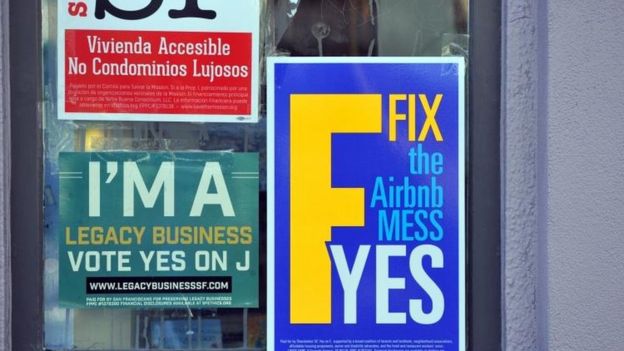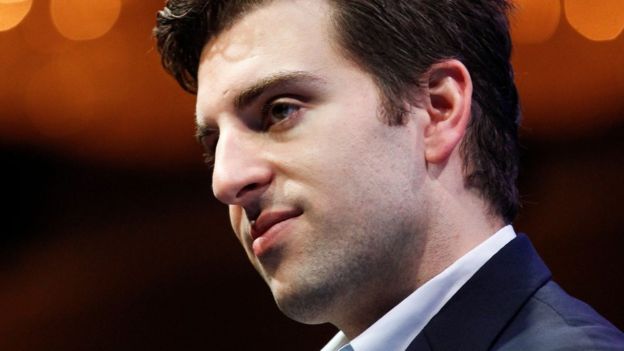
This article is more than
9 year oldAirBnB, the site that lets you rent out your spare rooms, or indeed your entire home, to tourists, is one of Silicon Valley’s brightest start-ups - a great idea, executed effortlessly.
The next step is to reach for the holy grail of travel - making tourists feel like genuine locals.
Its new Trips service, announced on Thursday, will let local people offer their knowledge, experience, work or even just their social life - for a price.
To take just one example: anyone can visit Nelson Mandela’s prison cell. But with AirBnB Trips you’ll be able to get a guided tour from a man who was a prison warden tasked with keeping watch over the great leader.
“The whole idea is that you can immerse yourself in local communities,” Chesky tells the BBC.
"We bring places to life through the people who live there."
It won’t be a free-for-all, he insists - you can't just offer “Bob’s pub crawl” on a whim and expect to get accepted. Instead, AirBnB is taking a highly-curated approach to ensure that the experiences aren’t terrible (or dangerous, unless that’s what you’re after).
“We decided to curate,” he says.

"We review the host's credentials, we make sure they do some test experiences, so that we can be sure people will enjoy them. It is a much higher level of quality vetting than before.”
The process includes helping hosts design professional old-movie-style posters to advertise their experience, and to record nifty short trailer videos to share more information.
This approach is by some magnitude more costly and time-consuming than just letting hosts do it completely by themselves. But it’s a tactic that paid off in the early days of AirBnB when the company invested in helping hosts take better pictures of their rooms, a decision which saw bookings skyrocket.
Chesky says the process of launching Trips has been on the go for more than four years. At launch, there are 500 experiences spread across 12 cities - London, Miami, Nairobi, Havana, Florence, San Francisco, Los Angeles, Tokyo, Detroit and Seoul, Paris and Cape Town.
‘Any excuse to evict'
AirBnB has a lot of enemies, big and small.
While to hosts the firm represents significant extra cash in their pockets, for others AirBnB can mean there’s suddenly a rowdy hotel on their previously quiet street.
Furthermore, landlords across the world are deciding to put homes that would be available for long-term renting onto AirBnB instead, driving rents up and contributing to housing shortages.
“The problem with AirBnB has never been the individual renters that are renting out part of their home or their place when they’re on vacation,” says Nancy Hanna, a Los Angeles-based attorney who represents people on low-incomes facing eviction.

Incomes so low, in fact, that Hanna tells me she once accepted some nice fruit as payment from a client.
“We’re seeing more and more property owners dedicating their entire buildings to AirBnB,” she continues.
“They just find any excuse to evict a tenant. Sometimes it will just be made up.
"What they’re hoping is that the tenant won’t have the resources or the legal know-how in order to be able to answer [the complaint] in time and they’ll just be evicted."
Sometimes landlords don’t even go the official route, Hanna says, instead just choosing to casually make their tenants’ lives a misery.
“Maybe they’ll stop offering repair services. Maybe they’ll start harassing the tenant.”
Regulation frustration
Some cities are tackling this issue head on. In New York, in perhaps the most significant anti-AirBnB action put in place so far, legislators have made it illegal to advertise temporary accommodation for less than 30 days if you live in a “multi unit”, i.e, an apartment building.
Repeat offenders can be fined up to $7,500. AirBnB is fighting the law in court.
It’s certainly not the only city where AirBnB is under the legislative microscope. Earlier this year I reported on Proposition F, an attempt by lawmakers in San Francisco to limit AirBnB hosts to being able to sell their space for a maximum of 75 days a year.
AirBnB pumped $8m into campaigning against the proposition. It won, but not by a lot.

For Chesky, 2016 has become yet another year of holding firm in the face of overwhelming opposition in key markets.
There’s light at the end of the tunnel, he says. He just doesn’t know how long the tunnel is right now.
“There’s definitely an end in sight. I’ll give you the answer I gave in 2010 - a year or two!
“Eventually here’s what will happen, San Francisco and New York, those cities will decide what path they want to go on. They will decide their fate.
“But the people in those cities will travel to other cities and see how those cities have dealt with AirBnB.”
Chesky believes that sheer people power will be what ultimately wins it for AirBnB, and that cities that do embrace the platform will be shown to have benefitted overall.
Race relations
On AirBnB, both guests and hosts are rated after a stay. This level of accountability is what the site is built around, building confidence.
But this kind of personalisation, where it’s good practice to share your real name and a smiley selfie, has also given rise to racism. Several studies showed that black people routinely found it harder to book than white.
Last month, Chesky and his team sent out an email to all of its members, both hosts and guests. In it, they set out an ultimatum: if you’re a racist, clear off.

It asked people to sign a “Community Commitment”, a pledge to treat all people equally. Those who didn’t sign would no longer be able to use the service.
A lot of people chose to decline.
“I don’t even know the number of the top of my head, but it was a lot,” Chesky says.
"We made a decision that this is not a service for everybody. We said ‘take it somewhere else. Not AirBnB.
“We started this company with the belief people are fundamentally good. Mostly everyone is really good, but when you have 100 million people, there are some who don’t believe in what you believe in."
Those who do sign the pledge are kept an eye on - instances of racism are being monitored on the site. If a person routinely denies bookings for people with great ratings but who also happen to be, say, Asian - the system will know, and AirBnB’s staff can step in.
In hindsight
Racism on the platform was a surprise at first, Chesky said - and he wished the company had realised it sooner so it could have set those out community guidelines from the off.
It’s one of many minor regrets he has about how the company was run in the early days.
“[Fellow co-founders] Joe, Nate and I were in a three-bedroom apartment. We didn’t have access to any policy people, any lawyers. We were trying to do our research but we weren’t very good at it.
“What I learned was the more you avoid things, the worse they get. We were slow to engage with a number of cities. People assumed the worst.
"There is sometimes distrust of new things, and a little bit of a generation gap between some of the politicians.
“There has been at times a gap in information. But I do think government and technology are finding ways to work together."
Monetising charm
I don’t agree with Chesky when he says there’s light at the end of the tunnel when it comes to pumping money into lobbying.
The nature of our cities, AirBnB’s business, and trends in politics means Chesky will forever have an evolving task to keep AirBnB on the right side of public and official opinion.
So, in many respects, broadening out what the company does is a wise move. Becoming more than just a place to stay could bring extra benefits to the communities that feel hard done by right now. AirBnB is effectively trying to monetise local charm.
And for what it’s worth, and at the risk of sounding like I’ve been “spun”, Chesky and his co-founders don’t seem hell-bent on profit at all costs in the same way other disruptive Silicon Valley start-ups often appear.
Chesky is, as your mother might say, a man that seems to have been “well brought up”, in that I buy his sincerity when he talks about doing what he can to limit the negative consequences his venture is having on communities.
And his actions have at least partly backed that up. In San Francisco, AirBnB limited the amount of homes you could post on AirBnB to just one per person.
"We stand firmly against people evicting people in cities that need the housing to use AirBnB,” Chesky says.
"In San Francisco we removed all people that had multiple listings. Thousands of homes. We agreed to a registration process which caps people being able to rent their homes for 90 days. You would never evict somebody, as far as I can tell, to rent your home only 90 days a year."
Of course you say that if he really cared he’d simply stop AirBnB from operating in cities with housing shortages. But he sees a different, and perhaps valid, obligation.
"I do acknowledge that there’s been challenges, but I hope people see there’s a bigger picture too, that lots of people stay in their homes because [of being able to rent rooms on AirBnB].
"We’ve agreed to restrictions. We definitely want to be part of the solution."